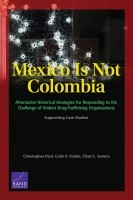| 来源类型 | Research Reports
|
| 规范类型 | 报告
|
| ISBN | 9780833084446
|
| 来源ID | RR-548/2
|
| Mexico Is Not Colombia: Alternative Historical Analogies for Responding to the Challenge of Violent Drug-Trafficking Organizations — Supporting Case Studies |
| Christopher Paul; Colin P. Clarke; Chad C. Serena
|
| 发表日期 | 2014
|
| 出版年 | 2014
|
| 页码 | 282
|
| 语种 | 英语
|
| 结论 |
Mexico Is Not Colombia, Nor Is It Especially Analogous to Other Historical Cases- Mexico faces challenges ranging from violence to a high level of weapon availability and corruption. The selected case studies were characterized by varying degrees of similar challenges.
- Mexico is not particularly analogous to Colombia, even though Colombia is the most frequently invoked comparison case. Furthermore, none of the other historical cases was much more analogous.
- Despite their significant differences, all the cases, including Colombia, share some important contextual commonalities and challenges with Mexico and thus provide useful lessons.
- Corruption and poor economic conditions were factors with a significant impact on the historical cases, and this holds true for Mexico as well.
Several Specific Types of Efforts Were Correlated with Improvement in the Historical Cases and Could Provide Lessons for Mexico- Challenges faced and outcomes achieved in the historical cases fell into two primary categories: those related to violence and those related to governance and corruption.
- The case outcomes most likely to hold lessons for Mexico specifically involved problems related to ungoverned spaces, poor governance, problematic economic opportunity structures, organized crime, corruption, and indiscriminate violence.
- Efforts that addressed multiple challenges were the most highly correlated with improvement in the historical cases, as were strategies employing multiple efforts simultaneously.
|
| 摘要 |
- Mexico's government should focus on efforts to combat violent drug-trafficking organizations that both disincentivize violence and remove the worst offenders.
- It should pursue strategies to improve governance and build and reform law-enforcement and judicial institutions to reduce corruption.
- It should engage in proactive counterviolence efforts targeting gangs and providing alternative opportunities for members and potential members.
- It should investigate ways to better leverage public outrage, such as selectively supporting citizen militias and enabling community policing.
- It should measure and evaluate the ability to combat violent drug-trafficking organizations and enforce related political decisions. For example, the military might be the best option to engage with these organizations in a particular area at a given time, but law enforcement reform could both improve upon policing strategies and reduce the risk of corruption in the military.
- Mexican policymakers should be willing to accept international support, particularly from the United States. The United States can be immensely helpful in training and equipping Mexican forces and mentoring Mexican police in intelligence-gathering tactics, techniques, and procedures.
|
| 主题 | Colombia
; Global Security
; Illegal Drugs
; Law Enforcement
; Low-Intensity Conflict
; Mexico
; Violent Crime
|
| URL | https://www.rand.org/pubs/research_reports/RR548z2.html
|
| 来源智库 | RAND Corporation (United States)
|
| 资源类型 | 智库出版物
|
| 条目标识符 | http://119.78.100.153/handle/2XGU8XDN/107810
|
推荐引用方式
GB/T 7714 |
Christopher Paul,Colin P. Clarke,Chad C. Serena. Mexico Is Not Colombia: Alternative Historical Analogies for Responding to the Challenge of Violent Drug-Trafficking Organizations — Supporting Case Studies. 2014.
|
|
文件名:
|
x1495316362932.jpg
|
|
格式:
|
JPEG
|

|
文件名:
|
RAND_RR548z2.pdf
|
|
格式:
|
Adobe PDF
|
除非特别说明,本系统中所有内容都受版权保护,并保留所有权利。